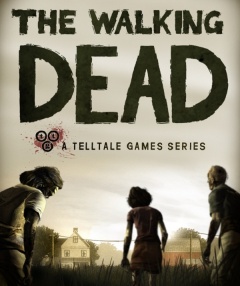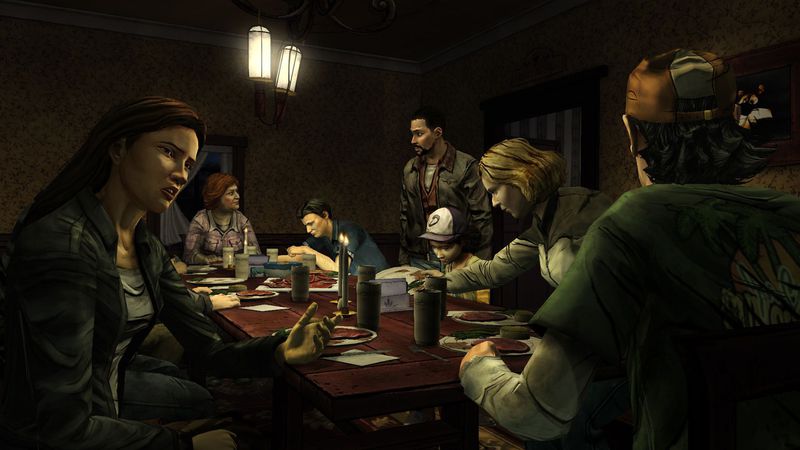The Walking Dead: Starved for Help
| The Walking Dead: Starved for Help | |
|---|---|
 |
|
| Platforms | Windows, OSX, Xbox 360, PlayStation 3, iOS |
| Genre | The talking dead |
| Score | 7  |
| Buy from Amazon | |
I’m not any kind of expert on zombie apocalypse fiction, but from my point of view, there’s two crucial points in the story that every good zombie story needs, and needs to do well. The first is the tension build-up in Act 1. Everyone watching, reading, or playing some sort of zombie media knows there will be zombies. The ones who don’t know are the characters, the heroes whose lives are about to be torn apart by the undead. The more tension the author can build, the more satisfying and terrifying the reveal will be when hell is unleashed.
The other crucial part of zombie fiction doesn’t involve the zombies at all, but human conflict. The zombie mythos rule of thumb says that the dead are never the true enemy in zombie fiction and that interesting drama lies in the living. This is true, but drama isn’t necessarily easy or obvious to write, so it’s not a given it’s executed well.
The Walking Dead already featured their tension build-up and zombie reveal in Episode 1: A New Day, but it still surprised me that Episode 2: Starved for Help almost immediately dropped running from zombies in favor of arguing with fellow survivors, but Telltale Games is apparently confident in their story, so let’s take a look.
Episode Reviews
- A New Day
- Starved for Help
- Long Road Ahead
- Around Every Corner
- No Time Left
Starved for Help takes place three months after A New Day, putting our band of survivors straight into “need food” mode as they work to defend the motel visited in the first episode. From the meager helpings available, it appears that most food has already been scavenged from around the nearby area, and with hard working adults and growing kids needing meals, it’s a dismal camp.
After a fast-paced, stomach-churning opening set in the woods, main character Lee Everett is put into temporary charge of distributing food to the 10 survivors. He’s given an apple, two packages of crackers and cheese, and a strip of beef jerky. Unsurprisingly, the game gives you full control over who to keep fed and who to ignore, which has nothing to do with restoring invisible hit points and everything to do with generating drama and messing up future conversation trees.
After one more encounter with a zombie, I should note: the final zombie you have to directly deal with over the next two hours, you’re invited to a farm by two good ol’ boys looking for some gasoline. They seem friendly and a trade for their farm food for anything seems like a good deal at this point, so the scene shifts there. After that it’s a slow boil to an exciting finish.
A very slow boil. Over the next hour you’ll repair a swing, repair fences, and talk a lot. These kind of moments can be touching and provide backdrops for exposition, but the action is too dispersed, in my opinion. Most of the drama keeps hitting the same notes, too: “you don’t care about my kid”, “you’re an asshole”, “you really don’t care about my kid!” It was satisfying to see one of those plot threads come to a squishy end.
But Telltale still produces some entertaining drama when the stakes are raised and your heartbeat is flying along with Lee’s, and it’s clear now that The Walking Dead isn’t about killing zombies or even fighting off humans, but giving you limited time to make some very tough decisions. The kind of decisions that you may need to rationalize to yourself later that it really was the right way to go, simply because option two was just as horrifying.
But doing the right thing is muddied by the presence of Clementine, who sees Lee as her surrogate father. The choices you make will not only be judged by others, but by a 10 year old girl who desperately needs an anchor in the whirlpool of post-apocalyptic life. Sometimes, the tough choices are made easier, you want to be a role model, after all; but at other times knowing Clementine is there (or even worse, not knowing she’s there until after the axe has been swung) can make choosing between A and B maddening.
Overall: 7
I didn’t enjoy Starved for Help as much as A New Day, but it is a solid continuation of the The Walking Dead and leaves me excited for Episode 3: Long Road Ahead. (trains!)

